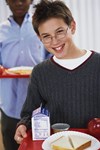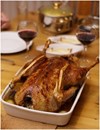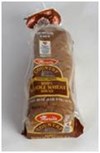Posted 12/1/2010
by Jean Budlong

The holiday season may bring family, friends, food and presents, but it doesn’t have to pack on the pounds, says a University of Georgia Cooperative Extension nutrition specialist Connie Crawley.
The key, she said, is to try to only indulge in meals on the actual holidays. “Just because there are several holidays, you don’t have to eat for two months straight,” she said.
She’s collected tips and tricks to make the holidays a little lighter – and a little less belt loosening.
Posted 11/29/2010
by Cornell University Press Room

Improved nutrition on a shoestring budget: $1 million USDA grant establishes center to help school cafeterias get students to eat better
Better living through healthy eating: The U.S. Department of Agriculture has granted $1 million to establish the Cornell Center for Behavioral Economics in Child Nutrition Programs at the university's Charles H. Dyson School for Applied Economics and Management. Cornell announced the grant officially on October 12, 2010.
The program is nicknamed BEN to reflect the aspects of behavioral economics and nutrition.
Brian Wansink, professor and David Just, associate professor, both in Cornell's Dyson School of Applied Economics and Management and who are co-directors of the center, have found that small, inexpensive changes to school cafeteria layout can help children and teenagers make better, more-nutritional choices.
Cool and convenient foods trump taste and price, but harnessing subtle influences in the behavior, schools can nudge students into healthier eating, say Just and Wansink. Schools have piloted their idea and have achieved impressive results. In one school, salad sales soared 300 percent in two weeks.
The center will offer two-year competitive grants for graduate students and junior faculty examining issues related to behavioral economics, children and food assistance programs. Workshops will be held for behavioral economists and experts in nutrition and policy. The center will disseminate research through websites, a practitioner newsletter, a policy briefing series and a working paper series. In fact, one website will be dedicated to provide information for school cafeteria administrators.
Chris Wallace, the former director of nutrition for the Corning City School District, Corning, New York, will help the center scale up national outreach efforts. Laura E. Smith, a doctoral student, will serve as an outreach specialist.
Smarter Lunchrooms website: http://smarterlunchrooms.org.
BEN center website: http://ben.cornell.edu/
Posted 11/23/2010
by Connie Breda

A class designed especially for an adult and child/children team will be taught by CCEFM nutrition program educators to encourage parents and children to make and eat meals together.
Families that eat meals together are more likely to consume better nutrients and less fat than those who eat apart. Cooking at home allows better control over the quality and quantity of foods being served. Children who eat with their parents also tend to do better in school and have a better relationship with their parents.
In this 1-1/2 hour class, adults will become equipped with tools, skills and confidence to engage family members in meal preparation. Participants will learn the importance and benefits of eating meals together and how to address common challenges faced by families who want to share meals together more often.
The class will include instruction, discussion, demonstration and hands-on preparation of classic holiday treats made healthier. The cost is $12, which covers a family up to two children.
Pre-registration is required. Call 518-762-3909 x 101 as soon as possible or email kak19@cornell.edu.
Posted 11/19/2010
by Jean Budlong

Often we go though our days without much thought as to what we eat and how we move. Living mindfully means paying attention to the events, activities, and thoughts that make up our daily lives. It means doing things on purpose, not just going through the motions of how we have always done things. Living mindfully encompasses all aspects of our lives and can help us eat healthy and be more active.
Simple Steps for Mindful Eating
- Eat with awareness. Be aware of what is on your plate and of the entire eating experience. Be present in the moment, and enjoy every aspect of the meal you are eating.
- Eat without distractions – no cell phone, TV, work, computer, newspaper, etc.
- Don’t eat while driving or working at your desk.
- Eat sitting down.
- Eat slowly, and enjoy every bite.
- Try to make each meal last at least 20 minutes.
Simple Steps for Mindful Physical Activity
- Be aware of how you move your body throughout the day.
- Do you take the stairs, or do you use the elevator?
- Do you walk to visit a co-worker, or do you use e-mail?
- Do you park farther away and walk, or do you look for the closest parking place?
- Think about all the movement you do throughout the day. Become more aware of how much you move or don’t move.
- Use positive self-talk. Physical activity has long been given a bad rap as being hard and boring. Use positive self-talk to highlight the good things about physical activity. Go from “I have to walk after work” to “I get to take a walk after work.”
- Enjoy the benefits of being physically active. Be aware of how you feel after physical activity. Do you feel better, stronger, happier, less stressed?
Source: extension.org
Posted 11/15/2010
by Jean Budlong

Ready to Roast your Holiday Bird? Check out this guide before you begin!
From selecting and purchasing your holiday turkey to saving and storing those leftovers safely, a download entitled "The Holiday Turkey" will provide you with essetnial USDA information you'll need to know.
Happy cooking and Happy Holiday!
Posted 11/10/2010
by Jean Budlong

Whole grains are not hard to find once you know a few simple facts. First, whole grains are grains that include the bran, endosperm, and germ. There are not that many grains that we consume as whole grains. Look at the food label for clues as to whether the food does indeed contain whole grains. Usually, just looking for the word "whole" is a good start - for example, "whole wheat" or "whole oats." There are several other grains that are whole grains - corn, popcorn, brown rice, barley, wild rice, buckwheat, bulgur, and quinoa.
Grains are called “refined grains” when only certain parts of the seed are used. Look at the food label for “100% whole grain," "100% whole wheat," or "100% whole oats.” A phrase like “multi grain," "wheat bread," or "made with whole grain” doesn’t mean the product is made entirely with whole grain. The color of the product is no help either. Sometimes brown coloring is added to a refined grain product to give you the impression that it’s whole grain. Other times, a white variety of whole grain wheat is used, making the whole grain product white.
Posted 11/8/2010
by Jean Budlong
People who make food choices based on superstitions, or food myths, may think they are making smart choices when in fact they aren't, said Robbie McKinnon, Pike County extension agent with the University of Arkansas, Division of Agriculture.
Much like superstitions, food myths persist in public consciousness. Some do contain a grain of truth, such as the popular myth that carrots will help people see in the dark. Technically this isn't true - but carrots do contain Vitamin A, which aids vision.
Posted 10/28/2010
by Karen Kosinski

November 9 and 16, 2010, 5:30-7:30 p.m.
It is projected that in thirty years, many more Americans will have Diabetes, perhaps as many as one in three people. Cooking for Diabetes is a two-session program that will provide practical, hands-on learning activities designed to help plan healthy snacks and meals for persons with Type II diabetes. Participants are expected to attend both sessions.
People who have been diagnosed with Diabetes, people who are living with persons with Diabetes and people who are cooking for people with Diabetes are encouraged to register and attend the two-part program.
Thanks to the sponsorship of Hero-BeechNut who has underwritten this program, both sessions are free to participants.
Both sessions will be held in CCEFM's Teaching Kitchen on the ground level at 55 East Main Street in Johnstown. Nutrition educators Roseann Doran and Eileen Lang will instruct.
Participants will be engaged in both classroom instruction and hands-on learning activities. Each household will receive a Diabetes cookbook and other hand-outs to aid in planning healthy meals at home.
Register early as this program is expected to fill up quickly. Call the CCEFM office at 518-762-3909 x 101 by November 8th. If you should need to cancel your registration at any time, it is essential that you call our office so that your space may be filled from a waiting list.
Posted 10/19/2010
by Kathleen McAllister

Family mealtimes really do matter! That’s why Cornell Cooperative Extension, Price Chopper, and Eat Smart New York (ESNY) have partnered to sponsor the second annual Family Mealtimes Matter Challenge, a four-week initiative dedicated to creating quality family time based on healthy, budget-conscious meals. From 10am- 2pm on Thursday, October 21st, and from 11am-3pm on Saturday October 23rd, select Price Chopper stores will feature Cornell Cooperative Extension and Eat Smart New York nutrition educators, as well as Price Chopper Dietitians to assist customers with healthy tips and recipes, as well as a pledge that can bring the whole family around the table.
Families can help children stay healthy physically and mentally simply by eating together. Research shows that when family members eat a home-prepared meal together they generally eat better. This means they consume more fruits, vegetables, and dairy foods, and fewer fried foods and soft drinks. Families that eat together in the home can also save money and strengthen the overall financial health of the family. Now that school is back in session, eating together is even more important, as it can lead to better grades and learning experiences for children.
Posted 10/5/2010
by Connie Breda
It's easy to overeat and overspend when the cook is accustomed to preparing meals for a family of 3 or more. In addition, with families relying so much on foods prepared away from home, the tendancy to over-indulge has contributed to the obesity epidemic and confusion about what a healthy protion looks like.
"Downsize Your Meals" will be offered on Tuesday, October 19th, 6:00-7:30 p.m. in teh CCEFM Teaching Kitchen on the Lower Level at 55 East Main Street, Johnstown.
The goal of the program is for participants to learn easy ways to shop for and prepare low-budget meals that are in a healthy portion size for families large or small as well as learn some tips about smart choices when dining out.
The class will include classroom instruction, hands-on activites and taste testing. Participants will take home recipes and printed materials provided in the class.
Register by October 18 by callling CCEFM, 518-762-3909 x 101. The cost of the class is $12 per person.















